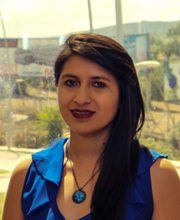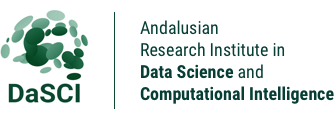Edna Bernal tells us about her experience as a DaSCI doctoral student
12 July, 2021

My name is Edna Bernal, I was born in Colombia, I am a systems engineer from the Universidad Pedagógica y Tecnológica de Colombia UPTC, since 2014 I am a teacher and researcher at the Universidad Nacional Abierta y a Distancia UNAD, currently a PhD candidate in Information and Communication Technologies (ICT) at the University of Jaén, with a research entitled: New methodologies for the classification of postural changes through sensors, which aims to design and implement a remote monitoring methodology based on machine learning techniques for the determination of postures, integrating a wearable device that helps caregivers to know the times and postures objectively.
The opportunity to do the doctorate at the University of Jaén arises thanks to the collaborative project funded by the Marie Curie Action (Research and Innovation Staff Exchange) of the European H2020 Programme entitled: “REMIND: The use of computational techniques to Improve compliance to reminders within smart environments. The main objective of the project is the creation of an international, cross-sectoral network to facilitate the exchange of staff to advance the development of reminder technologies that can be deployed in smart environments as a form of support for people with dementia. The project involves 16 partners from 10 countries, including companies, foundations and universities from across Europe, Latin America and Asia.
In the development of the REMIND project, in 2017 I made the first mobility to the University of Jaén and, with the advice and support of Dr. Macarena Espinilla and Dr. Javier Medina from the ASIA research group (Advances in Intelligent Systems and Applications). This mobility enabled me to broaden my knowledge in specific disciplines related to soft computing and intelligent environments, with the aim of generating synergies mainly related to the applicability and search for technological solutions. In addition, another fruit of the mobility focused on the collaboration of projects with potential for technology transfer to Colombia, identifying global needs in both countries and proposing solutions to generate an academic proposal in order to improve the quality of life of the population, from a focus on the application of soft computing and intelligent environments for the elderly.
In my first mobility to the University of Jaén, the proposal arose to carry out an analysis of the state of the art worldwide, especially in Colombia and Spain, focusing on the technologies used for monitoring people with no or very limited mobility, considering the problem of pressure ulcers. This type of ulcer is considered an adverse event, as well as an alarming epidemic that hides under the sheets of patients at different levels of care, identifying them as a critical situation in the care of these patients. To this end, the Neurobase neuro rehabilitation centre in Jaén was the driving force behind the proposal, with a team of specialists and a very in-depth knowledge of the problem.
In the light of the state of the art, the contribution of technology is considered to be very valuable in the prevention and treatment of pressure ulcers. Although this has been done indirectly in the development of support surfaces such as mattresses, cushions, heel cushions, heel cushions, and mittens, as well as in treatment techniques. However, nowadays, with the possibility of better access to technological tools, it has been observed that these tools make it possible to contribute directly, not only in the construction of support elements, but also in the monitoring and treatment of pressure ulcers. Despite the impact of the problem and the potential of technology, there is not much technology-based work aimed at improving the care and monitoring of posture changes for the prevention of pressure ulcers based on technology and artificial intelligence techniques.
To deepen our research, the financial support of the European project allowed us to carry out two international mobilities, the first one to the University of Halmstad (Sweden) and the second one to the University of Florence (Italy), through which I was able to nurture my knowledge in different related disciplines, such as: smart environments and applications, smart devices with sensors and methodologies for the recognition of activities. It was this knowledge that allowed me to generate the proposal aimed at the implementation of monitoring and follow-up methodologies for the prevention of pressure ulcers.
The proposed methodologies are based on the classification of bed postures, in addition to a fuzzy logic approach to calculate the priority of postural changes. The main components of this proposal refer to: (i) inertial sensors attached to clothing, which describe the orientation of patients and are installed on body areas in a non-invasive way; (ii) a data-driven model for posture recognition, which segments inertial data and position classification; iii) a fuzzy logic-based approach, which calculates the priority of postural changes for each body zone according to a defined protocol and the time elapsed since the previous posture in bed; and iv) a reminder to alert caregivers when the degree of posture change priority reaches a configurable threshold.
In my personal experience, I believe that we have achieved an important collaboration between research groups, which has allowed us to generate research and innovation projects both in Colombia and Spain, with the aim of meeting the future healthcare demands of the elderly population, improving their quality of life, reducing healthcare costs and complementing the specific needs of patients such as the elderly.
During these four years we have also participated in different research initiatives, projects, congresses and international seminars with my thesis directors, Dr. Macarena Espinilla and Dr. Javier Medina, who with their knowledge and experience have guided me to generate academic proposals and technological solutions to support global health issues.
Finally, one of the challenges of our proposal is technology transfer to Colombia, with the aim of carrying out a pilot project. For this purpose, visits were made to different medical centres in order to identify specific needs, with the result that the methodologies developed in my doctoral thesis could be of significant support to this problem in my country. The idea is to obtain funding from the Colombian government through national calls for proposals that will allow us to carry out this pilot project, with the support of researchers from the ASIA research group at the University of Jaén.





